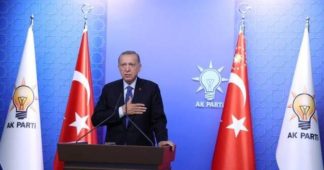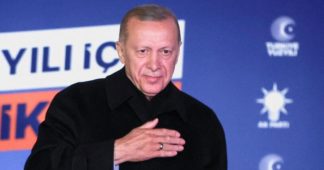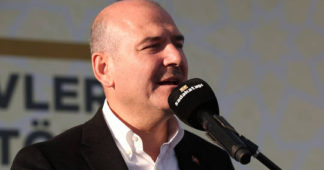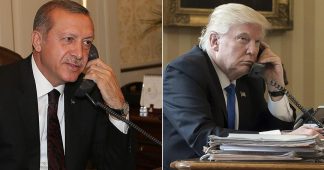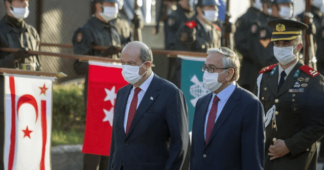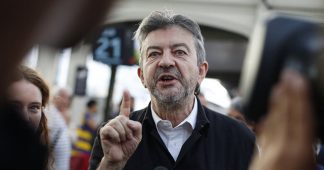Western countries and the Turkish opposition believe that Moscow actually helped Recep Erdogan win
May 29, 2023,
Text: Gevorg Mirzayan, Associate Professor of the Financial University
Russia’s most important foreign policy partner, Turkish President Recep Erdogan, has won the second round of presidential elections. Why did the West do everything to defeat him, why did the Turkish Maidan fail, due to which Erdogan managed to stay in his place and what does this now mean for Russia’s interests?
On May 28, the second round of presidential elections was held in Turkey. And it was won by Recep Erdogan. Not only because he won the majority of votes (52.17%), but also because he was able to avoid the color revolution.
And the probability of its occurrence was. Recep Erdogan started his election campaign in extremely unfavorable conditions. Serious economic problems (inflation for 2022 was more than 64%), multiplied by the catastrophic consequences of the February earthquake and a serious aggravation of relations with the West made its position very vulnerable. Almost the entire opposition united, fielded a single candidate (the leader of the Republican People’s Party, Kemal Kilicdaroglu) and began to conduct an aggressive election campaign. Which, in turn, was supported by the Western media. What is one cover of The Economist magazine worth, according to which Turkey is “on the verge of dictatorship” because of Erdogan.
“He was destroying the system of checks and balances. He turned most of the mass media into an instrument of state propaganda… He has thrown many critics, including opposition leaders, into prison… He bribed the judicial system by using the courts to persecute opponents… He sits in a huge palace and gives orders to courtiers who are too scared to tell him when he is wrong,” the publication wrote.
As Erdogan correctly said, “the United States, France, Germany, and the United Kingdom are interfering in the elections in Turkey.” Yes, Western interference in the Turkish elections was limited only to media and, possibly, economic support for the opposition. But only because, as some Western Turkologists correctly wrote, direct political support of the opposition from the leaders of the USA and the EU could only do harm – anti-American sentiments are too strong in Turkey now. According to some reports, up to 90% of the inhabitants of the republic (a NATO member country, by the way) consider America an enemy.
However, at the same time, these Turkologists called on Western countries to intervene after the elections – that is, after Erdogan declares his victory. They called for actually supporting the actions of the opposition to organize mass protests and an attempted coup.
At first it seemed that everything was going according to this scenario. During the vote count, opposition media and activists, relying on their own calculations, talked about the confident victory of their candidate. Political scientists were preparing for night protests. However, in the end, the protest did not take place.
A number of opposition leaders – Muharrem Inje, Meral Akshener – have already recognized Erdogan’s victory. “I congratulate Mr. Recep Erdogan… and wish him good luck in solving the problems that have accumulated in the country. Now I suggest the opposition to think about what we did wrong,” said Inje.
Some representatives of the opposition – in particular from the “Good Party” – believe that the reason for the defeat was “leaving two players on the bench – Ronaldo and Messi.” That is, simply put, the refusal to make a single candidate from the opposition one of its two highest–rated representatives – Istanbul Mayor Ekrem Imamoglu or Ankara Mayor Mansur Yavash, and the choice for this role of the respected, but not at all charismatic Kilicdaroglu, who for many years lost to Erdogan in various elections. At the time of publication of this text, Kilicdaroglu himself did not admit defeat – however, it is only a matter of time.
The opposition’s rejection of the Turkish Maidan is explained by several reasons. The successful mobilization of Erdogan’s supporters (whom the president took to the streets to “defend victory”), the competently conducted first round (when the incumbent president lacked less than half a percent of votes to win and the authorities did not finish these figures), the notorious lack of charisma and leadership qualities of Kilicdaroglu.
But one of the main reasons was still the cautious position of the West. Unwillingness to go all-in in this situation (because if the US and the EU had organized and supported the protests, and Erdogan had suppressed them, relations between the countries would have deteriorated completely). That is why all Western leaders – including French President Emmanuel Macron and his American counterpart Joe Biden – have already congratulated Recep Erdogan on his victory.
Moscow also congratulated him. “The election victory was a natural result of your selfless work as the head of the Republic of Turkey, a clear evidence of the support of the Turkish people for your efforts to strengthen state sovereignty and conduct an independent, independent foreign policy,” Vladimir Putin said. He expressed hope for the continuation of “our constructive dialogue on topical issues of the bilateral, regional and international agenda,” and also added that he attaches “great importance to the consistent implementation of the planned joint projects, primarily the construction of the Akkuyu NPP and the creation of a gas hub in Turkey.”
In the West, this cooperation is already seen as a kind of constant. An inevitable consequence of the fact that, as Newsweek writes, “Putin won the Turkish elections.” Western countries and the Turkish opposition believe that Moscow actually helped Recep Erdogan win – including by extending the grain deal for another two months (bringing money to the Turkish flour milling industry, as well as the reputation of an intermediary to Erdogan himself).
In reality, Russia did not interfere in any elections. She did not finance some participants and did not criticize others – she only responded to the anti-Russian statements of the same Kilicdaroglu.
Yes, most Russian political scientists supported Erdogan – but not because they considered the Turkish leader a pro-Russian politician, but because they viewed him as a lesser evil. As a pragmatic politician who tried not to integrate into the anti-Russian schemes of the United States (like most non-pragmatic leaders of Europe), but to make money on the Russian-Western conflict through hedging risks and selective cooperation with the Russian Federation.
“Ankara tried not to annoy Moscow and distanced itself from the sanctions war as much as possible. At the same time, Turkey sought to protect economic interests and establish itself as an “honest mediator”, maintaining relative neutrality and good relations with everyone. In economic terms, this made it possible to more than double the trade turnover with Russia (from 33 to more than 70 billion dollars, according to estimates) and bring Turkey to the second place after China in terms of trade with Russia by the end of 2022,” writes Pavel Shlykov, associate professor of the Department of History of the Near and Middle East of ISAA MSU.
In case of Kilicdaroglu’s victory, according to most experts, Turkey would have refused selective cooperation and would have joined Western sanctions. Simply because the opposition needed to respond well to the West for its support.
Erdogan’s victory does not mean that the course of pragmatic cooperation with Moscow has finally triumphed in Turkey. Now the pro-Western opposition is waiting for reformatting, after which it can join the struggle for Turkey’s return to the Western rails with renewed vigor.
“The end of Kilicdaroglu’s career and its continuation by two popular mayors: Istanbul – Ekrem Imamoglu and Ankara – Mansur Yavash. They were bent by the Americans to support Kilicdaroglu, they lost the leadership a few months ago – and now the way up is open. They will compete with each other if Erdogan does not eat them during this time,” Marat Bashirov, a well–known Russian political scientist, describes the possible future.
However, for some time, the risks from the Turkish direction for Moscow are still minimized. And, of course, Erdogan’s victory opens up new opportunities, removes a number of obligations from Moscow. “Erdogan has won. Russia needs to get out of the grain deal,” said Vitaly Tretyakov, Dean of the Higher School of Television at Moscow State University.
https://vz.ru/world/2023/5/29/
We remind our readers that publication of articles on our site does not mean that we agree with what is written. Our policy is to publish anything which we consider of interest, so as to assist our readers in forming their opinions. Sometimes we even publish articles with which we totally disagree, since we believe it is important for our readers to be informed on as wide a spectrum of views as possible.
